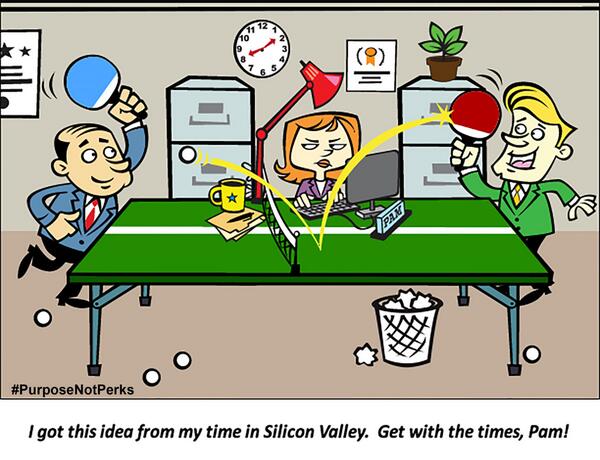Sometimes I picture this scene in my head …
It’s a parking lot outside a corporate HQ. A taco truck is pulling in. Let’s call it “Tasty Tacos by Tom” to be generic. It’s a big yellow truck, maybe an old bus. Tom has that hustle going.
A harried middle manager races out of the HQ, waving his hands. “Tom! Tom!” Tom is confused. He pulls the truck in front of the building and comes to the window.
The middle manager is panting now. He’s really doing himself in. “Tom,” he gasps, “we don’t need these tacos right now. It turns out that (wheezes) these kids don’t want tacos and foosball. They want respect, opportunities for growth, and maybe health insurance.”
At that moment, a Goodwill van pulls up and the middle manager nods at her. “The ping pong tables are on the third floor. We’ll need them out too.”
Tom is confused by this, but nods at the middle manager and pulls away. And now we’ve reset. The middle manager is off to find some software solution, ideally priced under-market, that can allow for this foreign concept of “respect” to permeate his workplace.
This was written as satire, and it’s not even tremendously funny, but it’s also the premise of a good interview with author Dan Lyons called “How Silicon Valley Made Work Miserable For Everyone.” Lots of good quotes in there — too many to even pull quote — so I’d suggest reading it. You might not agree with every point, but it’s interesting.
Why perks instead of basic human needs?
I got this one. It’s pretty easy. Perks allow you to keep salaries down, and basic human needs are hard to quantify on a spreadsheet and even harder for most human beings to execute on with other human beings. Heck, 40 percent of marriages barely work, and the 60 percent that do aren’t always fully functional. If we can’t get that kind of intimacy and discourse right at scale, you think Middle Manager Mikey is going to convey proper warmth and context to some peon who Mikey views as an infringement on his bonus? Guess again, Taco Tom.
Why is respect not normative at work?
Another easy one. Work is largely about control. Control becomes politics and process. Politics and process work against respect.
Why would we think that a perk could replace respect?
Because we don’t really “think” about anything related to work or designing work. We just do it, or we copy how someone else did it, or we do it and it works OK for a year or two and then 12 years later, you’re doing the same thing with a different business model and different people. Fun times. Thinking isn’t actually normative in most places.
Why do companies claim to be “community” or “collaborative” and then are not?
Why does Tom have a taco truck? Pursuit of the Almighty Dollar. That gets in the way of how things really are and how things could be. That’s mostly what messes up work, writ large — and yet, paradoxically or ironically, it’s also the point of work. So, haha!
Can we get respect to scale?
In a standard work context focused on hitting growth numbers and individual advancement? Absolutely not.
In a place with a few functional managers here and there? Sure.
Lest you think I am throwing feces around, consider this: in one major study, 60 percent of managers said they “didn’t have the time” to respect their employees.
I’ve been working for about 17 years now and never once have I written “Respect So-and-So” in Outlook or Google calendars. So I guess I’m not normative, eh? Right.
In recent years, there’s been research-based decreases in workplace trust too. Trust and respect seem pretty linked up. Maybe we’re not doing the whole “work design” thing too well.
Is it time to get the ping pong table off the Goodwill truck and start anew?

Good work, Ted!